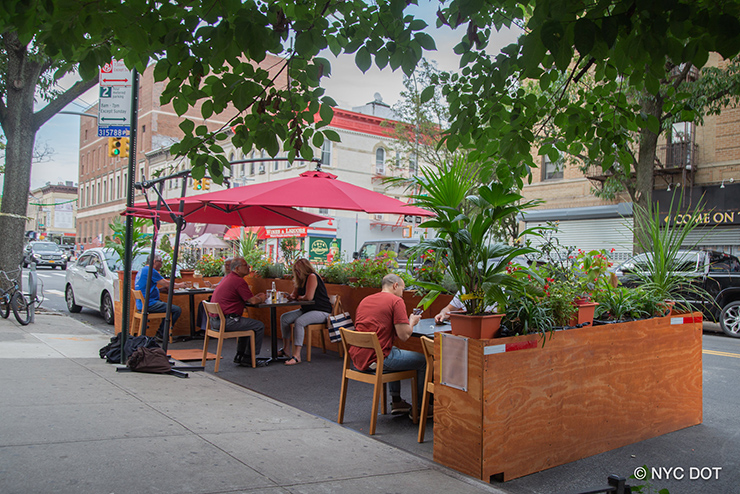Pandemic Outdoor Dining, Its Interesting Landlord and Tenant Litigation Implications
February 2022
During the Pandemic, I represented many New York City restaurant tenants and many New York City landlords of restaurants. One thing that made working on a landlord and tenant dispute involving a restaurant during the Pandemic different than cases involving other types of businesses was the advent of outdoor dining, the New York City Open Restaurants Program.
Undoubtedly, restaurateurs suffered along with other businesses during the Pandemic. For those restaurants who had sufficient resources and the correct circumstances to take advantage of the Open Restaurant Program, however, participation in the program could be a game changer.
I had one tenant-client who had a corner restaurant. Therefore, the restaurant had the opportunity of building outdoor seating on two fronts. The client did just that, investing over $100,000 in proper structures. At the time she made the investment, early in the Pandemic, it was unclear whether it would be worth it. The landlord was demanding the rent (which the tenant obviously could not pay), the tenant was spending money on the two outdoor kiosk structures, and it was not apparent how long it would take New Yorkers to come back to restaurants. This restaurateur’s faith, hard work, and investment, however, paid off. As diners returned, the capacity of the establishment was tripled.
There is a lot of coverage in the press about the Open Restaurants Program. The City is taking steps to make the program permanent and some New Yorkers dislike it. This is not, however, and article about the pros and cons of the program. This is an article about things in my lane, New York City landlord and tenant litigation. Here are some questions and conclusions I have drawn from my work litigating and settling cases involving the Open Restaurants Program:
(1) In the cases I settled, typically the tenant agreed to comply with all NYS and NYC codes and regulations concerning Open Restaurants Program seating areas (“Expanded Seating”).
(2) Tenants also typically agreed to pay any increased insurance premiums that were associated with the Expanded Seating.
(3) Tenants also typically agreed to pay violation fines or fees assessed to tenant or to landlord concerning tenant’s operations in the Expanded Seating area.
(4) As the Pandemic wore on and outdoor dining became popular, tenants who availed themselves of Expanded Seating created a new dynamic for settlement of their cases. First, a tenant engaged in a vigorous Expanded Seating situation obviously had more resources available to use to settle with the landlord. The problem for tenant’s counsel, however, was that landlords became aware of this fact, and would drive a harder bargain with such tenants.
(5) I found that some landlords were displeased by tenants who did not take the initiative for Expanded Seating. I represented one landlord who had a decision to make with respect to a restaurant tenant. We came to a place in the negotiation where the tenant was offering to stay but only for a very reduced rent, or to leave immediately in exchange for a waiver of arrears. Landlord chose to let the tenant go. She had lost faith in this particular restaurant tenant because he made no effort to include Expanded Seating. The Landlord was willing to pay a new broker’s fee and take a chance on extended vacancy in the hopes that she could get a much better price per square foot from the next tenant, based on the potential created by Expanded Seating.
(6) I am sure that the NYC Open Restaurants Program will continue to create a new dynamic between restaurant landlords and restaurant tenants. There are many questions to be answered. For example, it appears that the license for the Expanded Seating is between the restaurateur and the City. So, what happens to the Expanded Seating when a restaurant is evicted? Does that immediately cancel the license? The next tenant needs to be able to license the outdoor area. Will the transfer of such licenses be similar to what happens between the old restaurant tenant and the new with liquor licenses? Will the license be transferred?
(7) What will happen if a tenant leases a restaurant with the assumption that it can do Expanded Seating, but then, through no fault of the landlord, it cannot? Litigators such as I would very much like to see some of these issues built into the restaurant lease.
Respectfully submitted,






